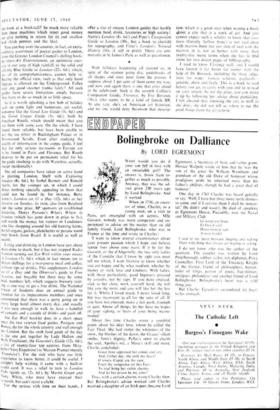ER
Bolingbroke on Dalliance
By LORD EGREMONT
WHAT %%mild you do if
your son fell in love with an unsuitable girl? The answer is, throw them to- gether as much as possible. Anyway, that was the ad- vice given 230 years ago
, by Lord Bolingbroke. And
When, in 1736, an ances- tor of mine, Chatle's, as a
young man, on a visit to Paris, got entangled with an actress, Mlle Gossein. nobody was more competent and ex- perienced to advise on 'the-matter than an old family friend. Lord -Bolingbroke, who was in France at the time and' Wriate to Charles: 'I want to know several circumstances about your present passion which I hope and believe scarce rises above your waist. If it be for the Gossein, or the d'Angerville. the two only ladies of the Comedic that I know by sight you must tell me which. I want likewise to know whether you are happy and by what medium, whether by money or stark love and kindness. With ladies. with those particularly, good Ingeniers proceed by assaults, not by saps. If you have enjoyed, stick to her close, work yourself hard, she will like you the more and you will like her the less for it. Whilst I loved much, I never loved long, but was inconstant to all for the sake of all. If you have not enjoyed, make a fair push, triumph or quit. Above all things, let her have no hopes of your sighing, or fears of your being incom- moded.'
About this time Charles wrote a youthful poem about his dear love, whom he called the Fair Thief. She had stolen the whiteness of the snow, the blushes of the dawn, the Graces' silken smiles. Juno's dignity, Pallas's sense to charm the soul, -Apollo's wit, a Muse's skill and more. Charles concluded :
Great Jove approved her crimes and art; And, t'other day. she stole my heart!
If lovers. Cupid. are thy care.
Esert thy vengeance on this Fair:
To trial bring her stolen charms.
And let her prison be my arms!
Thus. with a certain charm, wrote Charles then. But Bolingbroke's advice worked and Charles married a daughter of an Irish peer, became Lord Egremont. a Secretary of Stale and rather gross. Horace Walpole sx rote of him that he was the son of the great Sir William Wyndham and grandson of the old Duke of Somerset whose prodigious pride he inherited more than his father's abilities, though he had a great deal of humour,' .
One day in 1763 Charles was heard genially to say, 'Well, I have but three more turtle dinners to come Anti if. I. survive them I shall be immor- tal.' He didn't and wasn't, He died of apoplexy at Egremont House, Piccadilly, now the Naval and Military CIO.
Le temps es: beau, Et bleu Ic rid:
Doirctmem je vais .4 mon horde'.
I said to my heart hetueen sleeping and waking Thou wild thing that always art leaping or aching.
I do not know who was the author of the quatrain. The couplet was written by Lord Peterborough, soldier. sailor, wit, diplomat, Privy Councillor, First Lord of the Treasury, Knight of the Garter, friend of philosophers, button- holer of kings, patron of poets, free-thinker, intriguer, philanderer and another friend of Lord Bolingbroke. Bolingbroke's heart was a wild thing„too.
But Charles Egrern'ont surrendered his heart to his stomach.






























 Previous page
Previous page